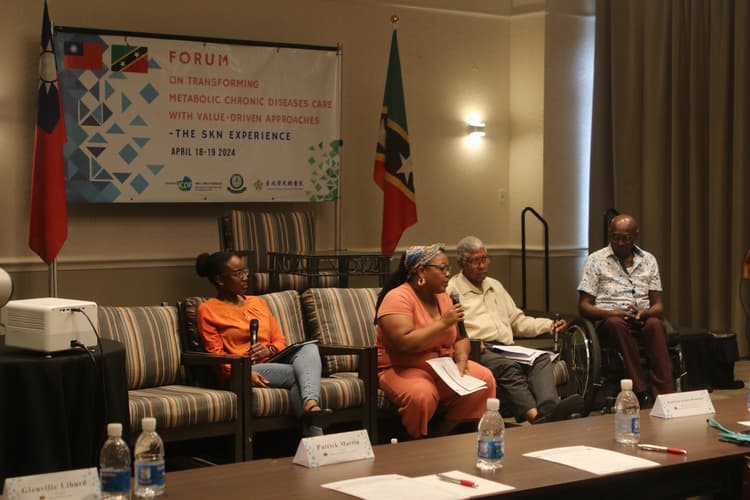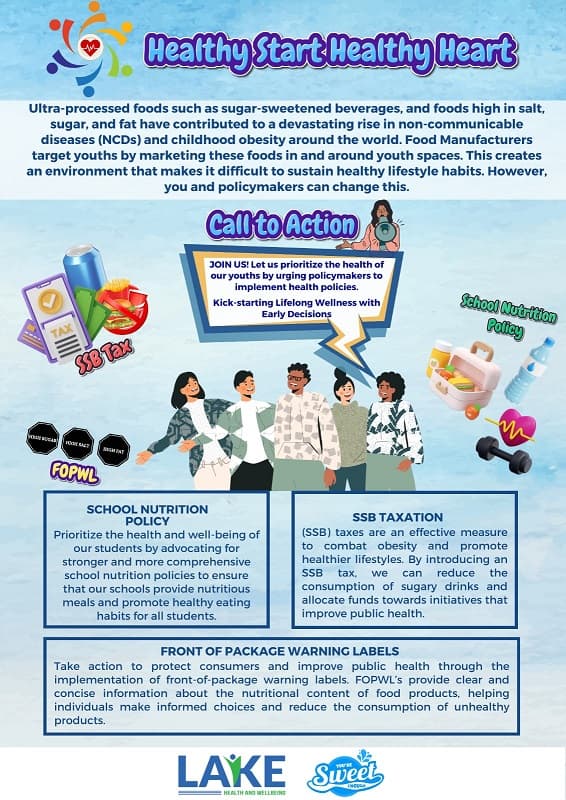You are sweet enough
Advocacy Letter Sent to MPs
Joint open letter to Members of Parliament calling for SSB policy interventions
September 17, 2021
ATTN: Members of the St. Kitts & Nevis National Assembly
Government Headquarters
Church Street
Basseterre
St. Kitts
Dear Members of Parliament:
Obesity and non-communicable diseases (NCDs) are significant health problems in St. Kitts and Nevis. In fact, NCDs are the leading causes of death among persons living in the Federation: 83% of premature deaths occur because of a preventable NCD. St. Kitts and Nevis has the second highest rate of type 2 diabetes per capita in the Caribbean with a prevalence rate of 23%. Studies indicate that overconsumption of sugar-sweetened beverages (SSBs) is one factor contributing to high rates of obesity and the development of diabetes and other NCDs. Of great concern is the fact that Caribbean children consume more SSBs per capita than any other region in the world, thereby contributing to the high prevalence of childhood obesity and NCDs. As such, we call on the government to act by implementing a package of evidence-based policies to reduce consumption of SSBs at a population level, and subsequently reduce risk factors associated with the development of NCDs.
NCDs create a large economic burden on the state; they cause premature death and disability; and they also have adverse effects on quality of life, labour and productivity. In 2015, the World Bank reported that continuing care treatment for diabetes and hypertension in St. Kitts and Nevis accounted for 48% of total public health expenditure. To date, the annual cost of care per diabetic patient (XCD$1,781) exceeds the average total health expenditure per capita (XCD$1,684). Public health policies to address NCDs should prioritise preventative measures in order to reduce future healthcare costs.
Data collected from a recent public opinion survey among residents and citizens of St. Kitts and Nevis shows that the public (92% of survey respondents) is concerned about overweight, obesity and NCDs as major health problems; most survey respondents (83%) want the government to implement strategies to address these public health issues. Therefore, to reduce risk factors associated with the development of diet-related NCDs in St. Kitts and Nevis, we urge the government to approve a national SSB policy framework that includes recommended policy solutions to lower consumption rates of SSBs and improve public health outcomes.
Recommended evidence-based policy solutions
- Implement an SSB excise tax of at least 20% to deter consumers from purchasing drinks high in sugar and use tax revenue to invest in other NCD prevention and control initiatives.
Evidence of effectiveness: After the 2018 implementation of a sugar tax in Bermuda, 1 in 2 Bermudians reported a reduced consumption of products with added sugar. Similarly, in Barbados, since an SSB tax was implemented in 2017, average weekly sales of all SSBs reduced by 4.3% in the first year and sales of bottled water increased 7.5%. Global SSB taxation trends suggest that higher tax rates produce greater changes in consumer behaviour, especially when implementation is combined with public education and sensitisation. - Restrict the sale and marketing of SSBs in and around schools to create healthier school environments.
Evidence of effectiveness: In Trinidad and Tobago, student consumption of SSBs decreased from 75% in 2011 to 49% in 2017 after Cabinet prohibited the sale and serving of SSBs in all government and government-assisted schools. - Adopt mandatory, evidence-based front-of-package warning labels to help consumers easily identify beverages that are high in sugar and enable them to make better, healthier choices.
Evidence of effectiveness: A 2019 PAHO study in Jamaica revealed that octagonal warning nutrition labels work best at helping people easily identify foods high in sugar, sodium and fats thus enabling them to choose healthier options. From the study, participants who were shown products with octagonal warning labels were nine times more likely to correctly identify those with excess sugar, sodium and fats, compared to products with a Guideline Daily Amounts (GDA) label.
The NCD epidemic we face in St. Kitts and Nevis and throughout the Caribbean region requires earnest attention and action. As such, the undersigned civil society organisations make a unified appeal to members of parliament in St. Kitts and Nevis to approve and implement a package of policies that prove to be effective at shifting consumption patterns and improving public health and wellbeing. We represent NGOs, community associations and regional alliance institutions that are committed to cultivating healthier environments; this commitment is essential for improved health outcomes and sustainable development.
Sincerely,
Advocates for healthy food environments (signatories):
- Lake Health and Wellbeing
- St. Kitts & Nevis Medical and Dental Association
- Essence of Hope Breast Cancer Foundation
- Because We Care
- Healthy Caribbean Coalition
- Caribbean Association of Nutritionists and Dieticians
- Nicole Foster, Deputy Dean & Head, Law & Health Research Unit, University of the West Indies
Share With :





